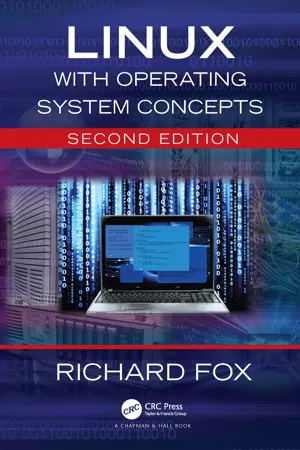
- 598 pages
- English
- ePUB (mobile friendly)
- Available on iOS & Android
Linux with Operating System Concepts
About this book
A True Textbook for an Introductory Course, System Administration Course, or a Combination Course
Linux with Operating System Concepts, Second Edition merges conceptual operating system (OS) and Unix/Linux topics into one cohesive textbook for undergraduate students. The book can be used for a one- or two-semester course on Linux or Unix. It is complete with review sections, problems, definitions, concepts and relevant introductory material, such as binary and Boolean logic, OS kernels and the role of the CPU and memory hierarchy.
Details for Introductory and Advanced Users
The book covers Linux from both the user and system administrator positions. From a user perspective, it emphasizes command-line interaction. From a system administrator perspective, the text reinforces shell scripting with examples of administration scripts that support the automation of administrator tasks.
Thorough Coverage of Concepts and Linux Commands
The author incorporates OS concepts not found in most Linux/Unix textbooks, including kernels, file systems, storage devices, virtual memory and process management. He also introduces computer science topics, such as computer networks and TCP/IP, interpreters versus compilers, file compression, file system integrity through backups, RAID and encryption technologies, booting and the GNUs C compiler.
New in this Edition
The book has been updated to systemd Linux and the newer services like Cockpit, NetworkManager, firewalld and journald. This edition explores Linux beyond CentOS/Red Hat by adding detail on Debian distributions. Content across most topics has been updated and improved.
Tools to learn more effectively

Saving Books

Keyword Search

Annotating Text

Listen to it instead
Information
Table of contents
- Cover
- Half Title
- Title Page
- Copyright Page
- Dedication
- Table of Contents
- Preface
- Acknowledgments and Contributions
- Author
- Chapter 1 Linux: What, Why, Who and When, and How
- Chapter 2 Bash
- Chapter 3 Linux File Commands
- Chapter 4 Managing Processes
- Chapter 5 Regular Expressions
- Chapter 6 Shell Scripting
- Chapter 7 User Accounts
- Chapter 8 Administering Linux File Systems
- Chapter 9 System Initialization and Services
- Chapter 10 Network Configuration
- Chapter 11 Software Installation and Maintenance
- Chapter 12 Maintaining and Troubleshooting Linux
- Bibliography
- Index
Frequently asked questions
- Essential is ideal for learners and professionals who enjoy exploring a wide range of subjects. Access the Essential Library with 800,000+ trusted titles and best-sellers across business, personal growth, and the humanities. Includes unlimited reading time and Standard Read Aloud voice.
- Complete: Perfect for advanced learners and researchers needing full, unrestricted access. Unlock 1.4M+ books across hundreds of subjects, including academic and specialized titles. The Complete Plan also includes advanced features like Premium Read Aloud and Research Assistant.
Please note we cannot support devices running on iOS 13 and Android 7 or earlier. Learn more about using the app